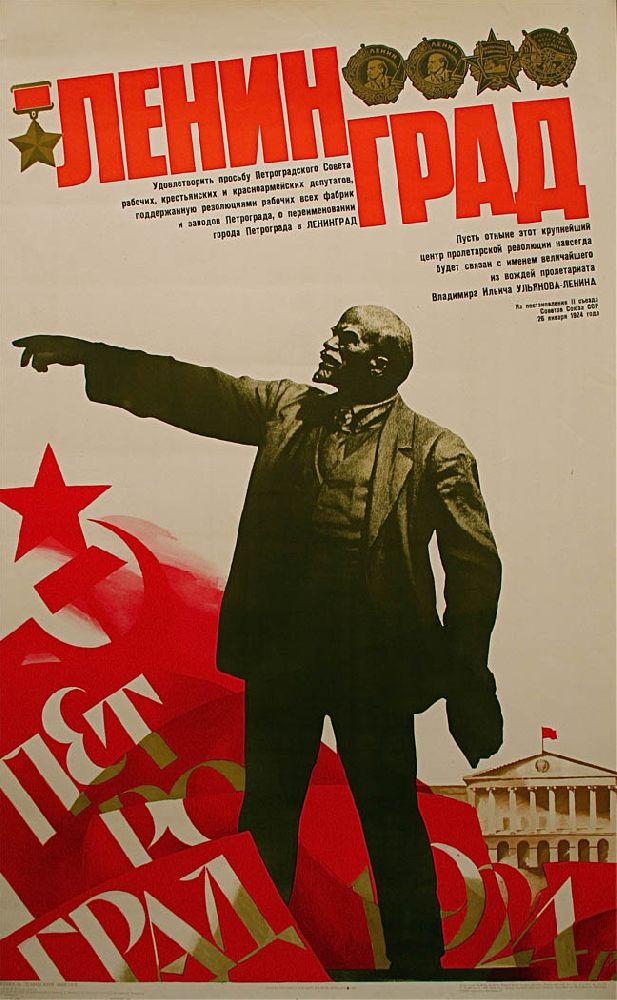

Title: Very Rare Russian Propaganda Poster Depicting Lenin 1924
Shipping: $29.00
Artist: N/A
Period: Contemporary
History: N/A
Origin: N/A
Condition: Excellent
Item Date: 1924
Item ID: 3667
Coloured Lithograph, 1924. Russian Propaganda Poster Depicting Lenin. The February revolution; the Provisional Government; the October revolution; the consolidation of Bolshevik power. With Lenin's death in 1924, he became the star of many of the posters, as the founder of the Soviet Union, and the one who had originated most of the Soviet policies. In spirit, Lenin remained the Soviet Leader! As such, Lenin was celebrated in 1927, for the ten year anniversary of the October Revolution, and in 1929, five years after his death.
Link: http://en.wikipedia.org/wiki/Lenin
Seeing this kind of Propaganda poster art helps ones understanding an the depth of the longer and shorter term causes and immediate consequences of the Russian Revolution, together with knowledge of the events surrounding it, and to enable them to assume personal intellectual responsibility in the definition of problems, the formulation of arguments and the identification of sources. A full description of the learning outcomes.
Lenin was born Vladimir Ilyich Ulyanov (Russian: Владимир Ильич Ульянов) on 22 April [O.S. 10 April] 1870, to Maria Alexandrovna Blank, a schoolmistress, and Ilya Nikolayevich Ulyanov, a physics instructor, at Simbirsk, a Volga River town in the Russian Empire of the nineteenth century; following family custom, he was baptized into the Russian Orthodox Church.[2][3] Later, the USSR renamed Simbirsk as Ulyanovsk.
In 1869, Ilya Ulyanov became the Inspector of Public Schools, and later the Director of Elementary Schools, for the Simbirsk Gubernia Oblast (province), a successful career in the Imperial Russian public education system. Yet, Tsarist cultural mores defined the Ulyanov family stock as "ethnically mixed" — "Mordovian, Kalmyk, Jewish (cf. Blank family), Volgan German, and Swedish, and possibly others"; nonetheless, being of the intelligentsia, the Ulyanovs educated their children against the ills of their time (violations of human rights, servile psychology, etc.), and instilled readiness to struggle for higher ideals, a free society, and equal rights. Subsequently, excepting Olga (dead at age 19), every Ulyanov child became a revolutionary.
In January 1886, his father died of a cerebral hemorrhage; in May 1887 (when Lenin was 17 years old), his eldest brother Aleksandr Ulyanov was hanged for participating in a terrorist assassination attempt against the Tsar, Alexander III (1881–94). His sister, Anna Ulyanova, with Aleksandr when arrested, was banished to an Ulyanov family estate at Kokushkino, a village some 40 km (25 mi.) from Kazan — those events transformed Lenin into a political radical, which official Soviet biographies represent as central to his assuming the revolutionary track as political life.
Complementing these personal, emotional, and political upheavals was his matriculation, in August 1887, to the Kazan University, where he studied law and read the works of Karl Marx. That Marxism-derived political development involved Lenin in a student riot, and consequent arrest, in December 1887; Kazan University expelled him, the police authorities barred him from other universities, thence was under continuous police surveillance — as the brother of a known terrorist. Nevertheless, he studied independently and earned a law degree; in that time, he first read Das Kapital (1867–94). Three years later, in 1890, he was permitted studies at the University of Saint Petersburg. In January 1892, he was awarded a first class diploma in law; moreover, he was an intellectually distinguished student in the Classical languages of Latin and Greek, and the modern languages of German, French, and English, but had only limited command of the latter two. In the 1917 revolutionary period, he relied upon Inessa Armand to translate an article of his into French and English; and wrote to S. N. Ravich in Geneva.